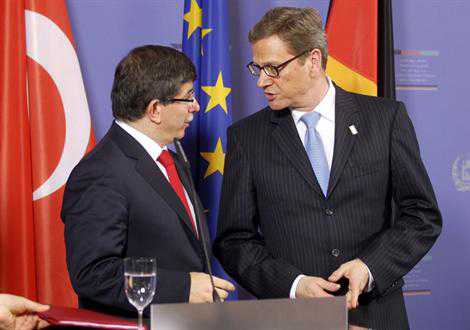By Lauren Williams
The Daily Star

German Foreign Minister Guido Westerwelle, right, talks to his Turkish counterpart Ahmet Davutoglu during a press conference after a meeting in Bonn, western Germany, Saturday, Dec. 3, 2011. On Monday, Dec. 5, the Afghanistan Conference takes place in Bonn. (AP Photo/dapd, Roberto Pfeil)
BEIRUT: Turkey will bank on sanctions and diplomatic pressure to force regime change in Syria and considers military intervention, including protection of safety or buffer zones, out of the question, a diplomatic official told The Daily Star.
The official made the remarks in the wake of three security breaches apparently targeting Turkish nationals in the last month, prompting some opposition groups inside Turkey to question their hard-line policy toward their neighbor and fears that the conflict may spill over the border.
An allegedly state-sanctioned attack on the Turkish Embassy in Syria on Nov. 13, in response to an Arab League decision to suspend Syria from meetings, was closely followed by a late-night gun attack on Turkish hajj pilgrims travelling through central Syria on Nov. 21, leaving three people injured, one seriously.
Pilgrims told diplomatic officials they had come under fire by men believed to be security forces after learning they were Turks. Whether the attacks were committed by Syrian state security forces has not been confirmed, but the two incidents prompted Turkey to issue an advisory to Turkish citizens against all but essential travel to Syria and the withdrawal of Turkish Embassy staff families.
Last week’s Istanbul Topkapi Palace gun attack, which left two Turks injured and the assailant dead, was widely believed to have been directly linked to the Syrian crisis, despite denials by security forces published in the Turkish daily Hurriyet last week.
The Libyan gunman, who opened fire inside the popular tourist destination was initially reported to have entered the country through Syria in a Syrian registered car.
The attack also coincided with the announcement from Turkish Foreign Minister Ahmad Davtoglu of a raft of sanctions against the country, including freezing all financial dealings and banning the transfer and sale of weapons. Syria cancelled the two countries’ bilateral Free Trade Agreement in response.
Turkish newspapers carried a flurry of reports calling for a review of the country’s laws on sales of weapons to foreigners, while industrialists complained the cancellation of free trade between the two former partners would hurt Turkish exports.
Diplomatic sources told The Daily Star they believed the Topkapi incident may have been conducted with the knowledge, if not coordination, of the Syrian state and may have been intended as a message.
The diplomatic source told The Daily Star there was no doubt the Syrian crisis had prompted a “growing security threat” toward Turkish nationals, especially given Turkey has opened its borders to the passage of some 10,000 Syrian refugees, but made clear neither the security incidents nor the humanitarian crisis would offer a pretext for any armed response.
Referring to speculation Syria could try to stir up separatist Kurds in the Eastern Kurdish border region, or tap in to sympathetic Turkish Alawite sentiment domestically, the source said “in reality … those cards are not relevant.”
“Syria really has no capacity to force Turkey on anything.”
The source squashed reports Turkey may enforce a humanitarian buffer zone along the Syrian border – similar to the one Turkey installed in Iraq in 1991 to stem the flow of roughly 1.5 million Kurdish refugees toward Turkey, persecuted under Saddam Hussein – saying geographical and logistical implantation made the plan “unfeasible.”
Such a plan, also floated by France’s Foreign Minister Alain Juppe in the form of “humanitarian corridors” was ill-matched to the circumstances on the ground and were impossible to effectively enforce, even with Syrian approval, the source said.
Unlike Iraq, civilians requiring protection in Syria are dotted across the country, rather than centered in one location, making a contained buffer zone nearly impossible to enforce.
Any civilian protection would need to be armed, the source said – something many privately say Turkey is unwilling to provide. Instead, he said Turkey would continue to assist refugees entering Turkey and that Turkish security and intelligence would accommodate the changing circumstances.
But for now, Turkey is banking on sanctions and diplomatic pressure to erode the current regime, he said, adding that Turkey considers the Syrian regime still “ relatively strong,” and predicting a long road ahead to regime change.
A version of this article appeared in the print edition of The Daily Star on December 05, 2011, on page 9.
via THE DAILY STAR :: News :: Middle East :: Military action in Syria not an option for Turkey.

Leave a Reply